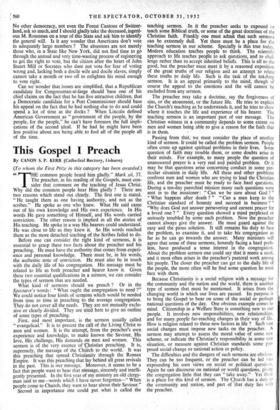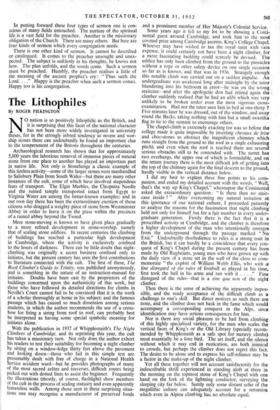This Gospel I Preach
By CANON S. P. KERR (Cathedral Rectory, Lisburn) (To whorl! the First Prize in this category has been awarded.) 66 THE common people heard him gladly." Mark xii, 37. The preacher, in his reading of the Gospels, must con- sider that comment on the teaching of Jesus Christ. Why did the common people hear Him gladly ? There are two reasons which stand out clearly. The first one is stated. " He taught them as one having authority, and not as the scribes." He spoke as one who knew. What He said came out of his own knowledge and Ids own experience. In His words He gave something of Himself, and His words carried conviction. The other reason is implied in all the stories of His teaching. He spoke in a way His hearers could understand. He was close to life as they knew it. So His words reached them as the more detached teaching of the Scribes failed to do. Before one can consider the right kind of sermons, it is essential to grasp these two facts about the preacher and his preaching. He must have the authority that comes from experi- ence and personal knowledge. There must be, in his words, the authentic note of conviction. He must also be in touch with the daily life of his congregation. His message must be related to life as both preacher and hearer know it. Given these two essential qualifications in a sermon, we can consider the types of sermon that are needed. What kind of sermons should we preach ? Or in the Spectator's words : " What ought the congregation to need?" We could notice four kinds of sennons which would be needed from time to time in preaching to the average congregation. They do not cover all the needs. They are not mutually exclu- sive or clearly divided. They are tied here to give an outline of some types of preaching. First, and most important, is the sermon usually called " evangelical." It is to present the call of the Living Christ to men and women. It is the attemlit, from the preachePs own experience and knowledge, to make known the Saviour, His love, His challenge, His demands on men and women. This sermon is of the very essence of'christian preaching. It is, supremely, the message of the Chuich to the world. It was this preaching that spread Christianity through the Roman Empire. It was this preaching that lay behind all great revivals in the past. This is our message. Moreover, it seems to be a fact that people want to hear that message, sincerely and intelli- gently presented. In the first year of my ministry an old clergy- man said to me—words which I have never forgotten—" When people come to Church, they want to hear about their Saviour." Second in importance one could put what is called the teaching sermon. In it the preacher seeks to expound or teach some Biblical truth, or some of the great doctrines of the Christian faith. Frankly one must admit that such sermons can be extremely dull. Yet there must be a place for the teaching sermon in our scheme. Specially is this true today. Modern education teaches people to think. The scientific approach to life teaches people to ask questions, and to chal- lenge rather,than to accept inherited beliefs. This is all to the good, but the preacher must meet it by a reasoned exposition of the great truths of our religion and an attempt to relate these truths to daily life. Such is the task of the teaching sermon. It is an appeal primarily to the mind, though of course the appeal to the emotions and the will cannot be excluded from any sermon.
The preacher may take a doctrine, say the forgiveness of sins, or the atonement, or the future life. He tries to explain the Church's teaching as he understands it, and he tries to show where it touches the life and experience of his hearer. The teaching sermon is an important part of our message. The Christian witness in a community depends to some extent on men and women being able to give a reason for the faith that is in them.
Passing from that, we must consider the place of another kind of sermon. It'could be called the problem sermon. People often come up against spiritual problems in their lives. Some question of faith may trouble them, or some doubts arise in their minds. For example, to many people the question of unanswered prayer is a very real and painful problem. Or it may be that questions arise conceiving conduct in some par- ticular situation in 'daily life. All these and other problems confront men and women who are trying to lead the Christian life, and the preacher must be ready to face hard questions. During a ten-day parochial mission many such questions were sent in to the missioner : " Can we be sure about God ? " " What happens after death ? " "Can a man keep to the Christian standard of honesty and succeed in business ? " "Why does God not answer persevering and earnest prayer for a loved one ? " EVery question showed a mind perplexed or seriously troubled by some such problem. Now the preacher cannot always give the answer. He must guard against the easy and the pious solution. It still remains his duty to face the problem, to examine it, and to take his congregation as far as he can go towards the answer. Many ministers will agree that some of these sermons, honestly facing a hard prob- lem, have produced a tense interest in the congregation. About the problem sermon one could say that it meets a need, and it most often arises in the preacher's pastoral work among his people. The closer the preacher can get to the daily life of the people, the more often will he find some question he must face with them.
Because Christianity is a social religion with a message for the commuoity and the nation and the world, there is another type- of sermon that must be mentioned. It arises from the changing world in which our lives are passed. Its purpose is to bring the Gospel to bear on some of the social or perhaps national questions of the day. One obvious example comes to mind. Citizenship in a Welfare State is something new to our people. It involves new responsibilities, new relationships, and for many .people far-reaching changes in their way of life. How is religion related to these new factors in life ? Such vast social changes must impose new tasks on the preacher. A sermon may attempt to assess the moral value of some new scheme, or indicate the Christian's responsibility in some new situation, or measure against Christhn standards some pro- posed social change or national action or-policy. The difficulties and the dangers of such sermons -are obvious. They, can be too frequent, or the preacher can be led into -expounding his own views on social or political questions. Again he can discoUrse on national or world questions, giving the congregation little that they can " take away." Yet there is a place for this kind of sermon. The Cburch has a duty to the community and nation, and part of that duty lies %Nit') the preacher. In putting forward these four types of sermon one is con- scious of many fields untouched. The nurture of the spiritual life is a vast field for the preacher. Another is the missionary obligation of the Church. There are many others. But here are four kinds of sermon which every congregation needs.
There is one other kind of sermon. It cannot be described or catalogued. It comes to the preacher unsought and unex- pected. The subject is suddenly in his thoughts, he knows not how. The plan unfolds, and the words come. Such a sermon must be preached. Humbly, the preacher realises a little of the meaning of the ancient prophet's ay : " Thus saith the Lord. . . ." Happy is the preacher when such, a sermon comes. Happy too is his congregation.



































 Previous page
Previous page